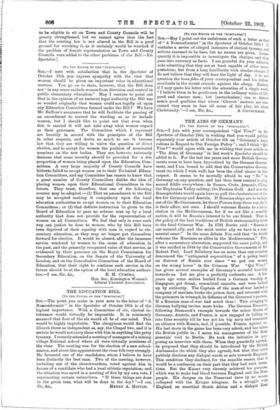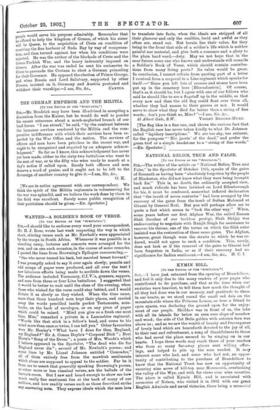THE AIMS OF GERMANY.
[To THE EDITOR OF THE "SPECTATOR1
SIR,—I join with your correspondent "Qui Vive ? " in the Spectator of October 18th in wishing that you would publish separately your article of October 4th on " Germany's Aspi. rations in Regard to Our Foreign Policy "; and I think "Qui Vive ? " would agree with me in wishing that your article on " The Aims of Germany " in last week's Spectator should be added to it. For the last ten years and more British Govern. ments seem to have been hypnotised by the German Govern. ment, and I am bound to add that the Conservative Govern. ment (to which I wish well) has been the chief sinner in this respect. It seems to be mortally afraid to say " No " to Germany on any question, and has thus been content to play second fiddle everywhere : in Samoa, Crete, Armenia, China, the Euphrates Valley railway, the Persian Gulf. And now the Russophobists would again have us pull the chestnuts out of the fire for Germany and Austria. If Russian ships are to be kept out of the Mediterranean, let those Powers keep them out, for it is their affair, not ours. I should welcome Russia to a naval station in the Mediterranean, for if we act like a sensible nation, it will be Russia's interest to be our friend. That is the policy of the best traditions of British statesmanship down to the fatal Crimean War. In 1791 Burke said : " Russia is our natural ally, and the most useful ally we have in a com- mercial sense." In the same debate Fox said that "be would welcome the Russians as allies in the Mediterranean." Pitt, after a momentary aberration, supported the same policy, and it was ratified in 1844 by the Conservative Government of Sir Robert PeeL Lord Salisbury has on more than one occasion denounced the " antiquated superstition " of a policy based on distrust of Russia ever since " we put our money on the wrong horse" in the Crimean War. "Qui Vive ?" has given several examples of Germany's scornful hostility towards us. Let me give a perfectly authentic one. A few years ago some sailors landed from a German warship at Singapore, got drunk, committed assaults, and were locked up by authority. The Captain of the man-of-war landed a company of marines, broke the prison door, and returned with the prisoners in triumph, in defiance of the Governor's protest If a Russian man-of-war had acted thus ! This cringing to German bullying invites more kicks. The German Emperor, following Bismarck's example towards the minor States of Germany, Austria, and France, is now engaged in lulling us into false security till he has got his big navy and cemented an affiance with Russia, and, if possible, France, against us. His last move in the game has been very adroit, and has taken the British public in: I mean his management of the Boer generals' visit to Berlin. He took the initiative in Pm posing an interview with them. When they guardedly agreed. he proposed that they should be introduced by the British Ambassador (to which they also agreed), but that they must publicly disclaim any disloyal words or acts towards England. This condition they declined, for the sensible reason that it would be a confession on their part that they had such inter' tions. But the Kaiser very cleverly achieved his purIx'se" which was to make bad blood between England and the Boer people. His designs on the Transvaal have by no meanns
.
collapsed with the Kruger telegram. In a struggle /It" England an unsettled South Africa and a disloyal Boer people would serve his purpose admirably. Remember that he offered to help the kingdom of Greece, of which his sister will be Queen, to the acquisition of Crete on condition of receiving the fine harbour of Suda Bay by way of compensa- tion, and then turned against_ her when his conditions were rejected. He was the author of the blockade of Crete and the Greco-Turkish War, and the heavy indemnity imposed on Greece. After the war was ended he sent his emissaries to Crete to persuade the Cretans to elect a German princeling for their Governor. He opposed the election of Prince George, and when Russia and Lord Salisbury, supported by other Powers, insisted on it, Germany and Austria protested and withdrew their warships.—I am, Sir, &c., CANTUS.











































 Previous page
Previous page